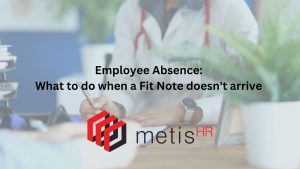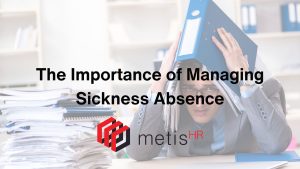
What To Do When a Fit Note Doesn’t Arrive.
Do you know what to do when a fit note doesn’t arrive from you employee? At Metis HR we get asked this question a lot!
Articles

Do you know what to do when a fit note doesn’t arrive from you employee? At Metis HR we get asked this question a lot!

When you have been left covering the work of someone who has phoned in sick, it quickly focuses your mind as to the importance of

In March 2022 the government told us that living with covid 19 is now necessary and that the covid restrictions were over. What does that
Men’s Health in the Workplace isn’t just a moral issue, it’s a commercially sound issue too. One in five men die before they reach 65,
Many clients have been asking these last few weeks about Furlough and the Job Retention Scheme. We have some guidance from the government on the
If you’re planning on introducing Return to Work Interviews, your next move is likely to be wondering how to carry out a return to work
It’s an awful conversation to have, being asked about the pension rights of an employee with a terminal illness. A recent decision by the Pensions
Extended Mental Health Leave Returning to work after an extended absence due to mental health issues can be a daunting prospect for employees. Recent research
Managing an employee with multiple sclerosis need not be challenging for employers. As one of the most common diseases of the central nervous system, Multiple
If you think your employee is faking illness to take time off work, here’s a recent case to help you decide what you may need
Categories
Copyright © 2020 Metis HR Ltd. Registered Company No: 07554123. All Rights Reserved
Website by Thomas Cole Digital